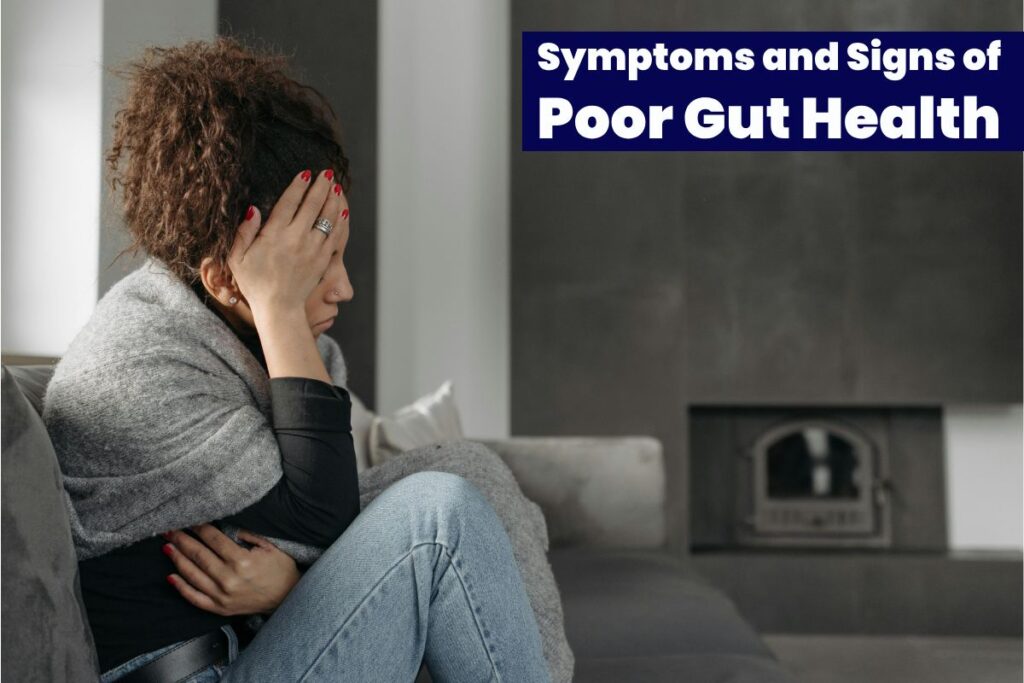
Symptoms and Signs of Poor Gut Health
Symptoms and signs of poor gut health indicate that the gut is unhealthy, and our well-being is at risk.
A common misconception is that digestive issues are the only signs of poor gut health.
However, while digestive problems can indeed be one of the indicators, this narrow perspective fails to capture the full scope of potential symptoms.
It is essential to recognize that poor gut health can present with a wider range of symptoms than just digestive issues like bloating, constipation, or diarrhea.
Other symptoms may include fatigue, skin problems, mood disturbances, and even autoimmune responses.
By expanding our understanding of gut health symptoms, we gain a more holistic perspective on their importance.
Digestive issues might be the most noticeable signs of gut imbalance, but they don’t paint the whole picture.
A healthy gut microbiome is essential for our well-being, and recognizing the diverse signs of its distress is the first step toward achieving optimal health.
While there isn’t one single test to definitively measure gut health, our bodies have a remarkable way of communicating when the delicate balance within our gut microbiome is disrupted.
In this article, we will unveil some of the hidden signs that might point toward poor gut health.
The Hallmarks of a Healthy Gut
The gut, often referred to as the “second brain,” plays a surprisingly significant role in our overall health. The gut, a complex ecosystem teeming with microorganisms, plays a crucial role in our overall health.
When the delicate balance of this gut microbiome is disrupted, the consequences can manifest in surprising ways, extending far beyond the digestive tract.
An unhealthy gut can have a ripple effect, impacting our overall health in surprising ways.
But before we delve into the signs and symptoms of an unhealthy gut, let’s explore how a healthy one functions.
A well-functioning gut is characterized by regular, hassle-free bowel movements. Ideally, this means passing well-formed stools one to two times a day without experiencing issues like diarrhea, constipation, or loose stools.
Additionally, a healthy gut shouldn’t cause rectal discomfort like hemorrhoids or abdominal disturbances like gas, bloating, and pain.
But a healthy gut goes beyond just smooth digestion. It also translates to a reduced sensitivity to foods and external stressors like environmental changes or anxiety.
Furthermore, individuals with a balanced gut microbiome tend to exhibit greater resilience against various health concerns, including autoimmune diseases, skin problems, and inflammatory responses.
By understanding the hallmarks of a healthy gut and the potential consequences of an unhealthy one, we can take proactive steps to cultivate a thriving gut microbiome, paving the way for a healthier and happier life.
Common Signs of Poor Gut Health
Recognizing the signs of poor gut health is crucial, as it can pave the way for proactive steps to address any underlying imbalances. Let’s explore these common indicators in more detail:
Digestive Discomfort
This is a common symptom of an unhealthy gut. When the gut is out of balance, it can lead to various digestive issues that cause significant discomfort.
These digestive discomforts are often signs of conditions such as Irritable Bowel Syndrome (IBS), Small Intestinal Bacterial Overgrowth (SIBO), or other gastrointestinal disorders that are influenced by the state of the gut microbiome.
Here are some key aspects of digestive discomfort resulting from poor gut health:
Gas and Bloating
Excessive or foul-smelling gas can be the result of an overgrowth of certain harmful bacteria in the gut. Bloating is also a common sign of gut imbalance.
When the gut microbiome is out of whack, fermentation processes can become inefficient, leading to excessive gas production and causing the abdomen to feel swollen and uncomfortable.
Constipation or Diarrhea
Irregular bowel movements, be they constipation or diarrhea, can signal an imbalance of gut bacteria or an infection.
Poor gut health can slow down the movement of food through the digestive tract, leading to infrequent or difficult bowel movements.
Healthy gut bacteria play a role in regulating stool consistency and motility. Disruptions in this bacterial community can lead to an unhealthy gut.
This can disrupt normal bowel function, resulting in difficulty passing stool.
An unhealthy gut can also cause frequent, loose, or watery stools and frequent bowel movements.
Abdominal Pain
Imbalances in the gut can lead to inflammation and irritation of the intestinal lining, causing cramps and pain in the abdomen.
When the gut microbiome is out of balance, it can lead to increased inflammation and irritation of the delicate lining of the intestines.
This inflammation can trigger the nerves in the abdominal region, resulting in cramps, aching, or general discomfort in the abdominal area.
The abdominal pain associated with poor gut health is often described as cramping, aching, or a general feeling of discomfort in the belly region.
This type of abdominal pain can be a clear indicator that the gut is experiencing imbalances or distress, and addressing the underlying gut health issues can help alleviate this discomfort.
Heartburn and Indigestion
An imbalanced gut microbiome can disrupt the natural digestive processes, leading to heartburn, indigestion, and acid reflux.
This disruption can occur in two ways. Firstly, when the gut microbiome is out of whack, it can affect the function of the lower esophageal sphincter (LES), a muscular valve between the esophagus and stomach.
A weakened LES allows stomach acid to back up into the esophagus, causing heartburn and discomfort.
This backflow of acidic stomach contents can irritate the delicate lining of the esophagus, leading to the unpleasant sensations associated with heartburn.
Secondly, in some cases, an imbalance in gut bacteria can lead to insufficient stomach acid production.
Stomach acid plays a crucial role in the digestive process, breaking down food and enabling proper nutrient absorption.
When stomach acid levels are inadequate, it can hinder digestion and contribute to heartburn, indigestion, and other digestive issues.
This disruption in the natural balance of stomach acid can exacerbate the backflow of acidic contents, further aggravating the symptoms of acid reflux.
Beyond Digestion: The Mind-Gut Connection
The mind-gut connection is a fascinating area of research that highlights how an unhealthy gut can impact not just digestion but also mental and emotional well-being.
This connection, often referred to as the gut-brain axis, underscores the bidirectional communication between the gastrointestinal tract and the brain.
Here are some key points about how an unhealthy gut can affect the mind:
Mood Swings and Anxiety
Emerging research suggests a potential connection between gut health and mental well-being.
The gut and brain are intricately connected, and an imbalance in the gut microbiome can influence mood, cognitive function, and emotional well-being.
Certain gut bacteria produce neurotransmitters like serotonin and dopamine, which play a crucial role in regulating mood and emotional state.
When gut bacteria become imbalanced, it can disrupt the production and signaling of these neurotransmitters, potentially contributing to feelings of anxiety, low mood, and even depression.
In essence, individuals with poor gut health may be more susceptible to experiencing mood disturbances like anxiety, depression, or irritability.
Sleep Disturbances and Fatigue
Our gut and brain are in constant communication via the gut-brain axis. An imbalance in the gut microbiome can disrupt this communication, leading to sleep issues and heightened stress responses.
When gut bacteria are out of balance, it can disrupt the body’s natural sleep-wake cycle.
This can manifest as difficulties falling asleep, staying asleep, or waking up feeling unrefreshed. Restless nights and waking up tired have become common occurrences.
The gut microbiome also influences how the body responds to stress.
Dysbiosis, or an imbalance in gut bacteria, can lead to an exaggerated stress response.
This can negatively impact mental health and increase susceptibility to stress-related disorders.
Furthermore, an unhealthy gut can contribute to persistent feelings of tiredness, a lack of energy, and a general feeling of being drained, known as chronic fatigue.
Other Symptoms and Signs of Poor Gut Health
Poor gut health can manifest through a variety of symptoms and signs beyond digestive discomfort and its effect on the mind-gut connection.
Recognizing these diverse symptoms and signs can help individuals identify and address underlying gut health issues.
Here are some other key symptoms and signs of poor gut health:
Weakened Immune System
A healthy gut microbiome plays a vital role in supporting the immune system.
An imbalance in the gut microbiome, or gut dysbiosis, can compromise the immune system, making an individual more susceptible to frequent infections, illnesses, and autoimmune diseases.
Gut dysbiosis disrupts the gut-immune axis, compromising the immune system’s ability to respond effectively to pathogens.
This weakened immune response can lead to frequent infections and illnesses.
Moreover, imbalances in the gut microbiome can trigger autoimmune disorders by disrupting the immune system’s ability to distinguish between self and non-self, resulting in the body’s immune system mistakenly attacking its own healthy cells and tissues.
Common autoimmune conditions linked to gut dysbiosis include inflammatory bowel diseases, rheumatoid arthritis, multiple sclerosis, type 1 diabetes, and systemic lupus erythematosus.
Migraines
The gut-brain connection can influence the development of migraines and other types of chronic headaches.
Emerging research highlights a strong connection between gut health and migraines.
Imbalances in the gut microbiome can lead to increased systemic inflammation, which sensitizes the trigeminal nerve system responsible for migraine pain.
This inflammation lowers the threshold for migraine triggers, making individuals more prone to attacks.
Additionally, an imbalanced gut can affect neurotransmitter production and regulation, particularly serotonin, which is crucial in migraine pathophysiology.
Gut-derived metabolites like histamine and tyramine, linked to migraine triggers, can also be altered when gut health is compromised.
These factors together illustrate how poor gut health can contribute to the onset and severity of migraines.
Sugar Cravings
An unhealthy gut microbiome can lead to an increased craving for sugary and processed foods. The relationship between an unhealthy gut microbiome and increased sugar cravings is complex.
Certain gut bacteria thrive on sugary, processed foods and can influence our brain’s reward pathways, leading to heightened cravings.
Poor gut health can also disrupt the production and regulation of hunger-related hormones like ghrelin and leptin, causing a distorted sense of hunger and satiety and increasing cravings for sugary foods.
Additionally, inflammation from an imbalanced gut microbiome can trigger hormone and neurotransmitter release that drives sugar cravings, making it harder to resist these foods.
Unintentional Weight Changes
The gut microbiome significantly influences metabolism and weight management.
When the gut is imbalanced, it can lead to unintentional weight changes, both gain and loss.
Poor gut health affects nutrient digestion and absorption, resulting in malabsorption and unexplained weight loss.
Conversely, an unhealthy gut microbiome can contribute to weight gain.
Due to this imbalance, certain gut bacteria can efficiently extract and store calories, promoting weight gain even without changes in diet or physical activity.
Additionally, an imbalanced gut disrupts hormone regulation, affecting insulin, leptin, and ghrelin, which control appetite and energy metabolism.
This disruption can lead to dysregulated appetite, cravings, and unintended weight fluctuations.
Skin Conditions
Poor gut health can manifest as various skin conditions due to the close connection between the gut and skin.
Imbalances in the gut microbiome can lead to systemic inflammation, which affects the skin.
Key examples include acne, eczema, and psoriasis. Inflammation from a disrupted gut microbiome can cause acne, leading to breakouts and skin irritation.
An imbalanced gut microbiome can exacerbate eczema by causing immune system dysregulation, resulting in red, itchy rashes.
Poor gut health is also linked to psoriasis, where gut imbalances drive the overproduction of inflammatory compounds, leading to scaly, red patches on the skin.
Addressing gut health through diet, probiotics, and targeted interventions can help alleviate these skin conditions.
Bad Breath
Chronic bad breath, or halitosis, is an often-overlooked symptom of poor gut health.
Imbalances in the gut microbiome can lead to the overgrowth of harmful bacteria that produce volatile sulfur compounds (VSCs), which have a rotten or sulfurous odor.
This connection exists because the gut and oral cavity are closely linked, allowing gut bacteria to influence the microbial composition of the mouth.
Additionally, poor digestion and undigested food in the gut can increase VSC production.
Final Note
The intricate link between the gut microbiome and various aspects of human health becomes clear when we consider the far-reaching consequences of gut dysbiosis (imbalance).
Migraines, sugar cravings, unexpected weight changes, and a compromised immune system are just a few examples of how poor gut health can manifest.
However, by recognizing these warning signs, we can become more attuned to our gut health and take proactive steps towards restoring a healthy gut microbiome. Addressing underlying gut imbalances through dietary modifications, probiotic supplementation, and other gut-healing strategies can potentially alleviate these issues and significantly improve overall well-being.
Maintaining a diverse and thriving gut microbiome should be a priority, as it serves as the foundation for optimal physical and mental health.
By prioritizing gut health, individuals can take proactive steps towards managing and preventing a wide range of health concerns, ultimately enhancing their quality of life.
Important Note: It’s crucial to remember that these symptoms can have various causes. Consulting a healthcare professional is essential for diagnosis and appropriate treatment.
DISCLAIMER:
The information provided in this article about “Gut Health” is intended for general informational purposes only and does not take into account your specific circumstances. It should not be considered a substitute for professional medical assistance or advice. You should not rely solely on the information presented in this article when making decisions. Any actions taken based on the information in this article are done so at your own risk and responsibility.







